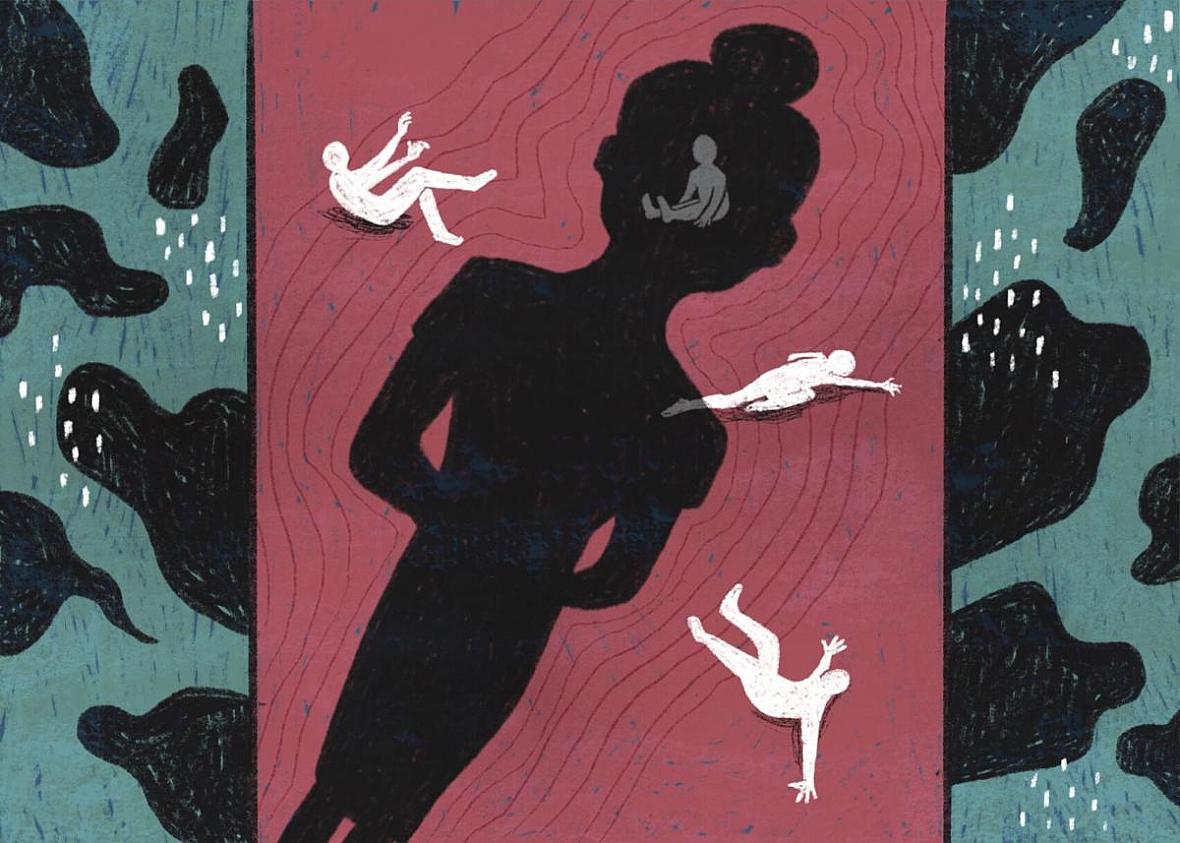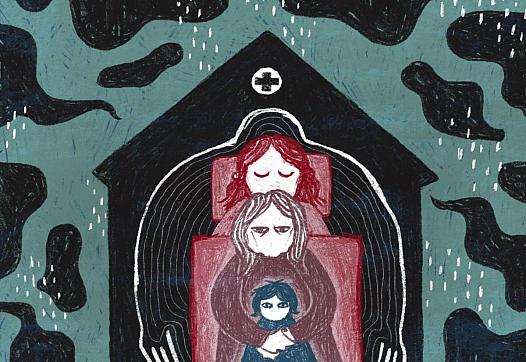Unsafe, Part 3: Prosecutions rare in Arizona when the victim is disabled
The story was originally published in Arizona Daily Star/KJZZ with support from the USC Annenberg Center for Health Journalism’s 2022 Data Fellowship.

Illustration by Theo Grace Quest
On a winter night in January 2021, Michele stopped for gas. As she was waiting, she pulled out her phone to check the nanny cam.
A cartoon blared in the background, it was impossible to hear any voices. But Michele could see her 4-year-old son jumping from couch to couch in the living room of their West Valley home. (She asked that her real name not be used to protect her family.)
Michele’s son is autistic, one of 45,000 Arizonans who qualify for services from the state’s Division of Developmental Disabilities — health care, job training, recreational programs, therapy and babysitting, referred to as respite care. A state agency had sent a woman in her early 20s over during the holidays to provide respite. Things had gone OK, so when Michele needed to take her older daughter to gymnastics, she reached out again to the young woman.
As Michele watched, the caregiver sat on a couch with her back to the camera, and did — something — with her shirt.
“At the time, I wasn’t really understanding what was going on,” Michele said. “I thought she had a sweatshirt on and maybe lifted her sweatshirt up to show him a Disney character or something.”
As Michele continued to watch, it appeared that the caregiver was exposing herself to the little boy. After a few minutes, they both disappeared down the hall. Michele rushed home.
“I walked her to the door, locked the door, and then called the police,” she said.
As calmly as she could, Michele asked her son what happened. She says he told her that the caregiver put milk on her breast and asked him to suck it. Michele videotaped the boy telling her about the incident.
Michele: “A little bit of milk. On where?”
Son: “On her boobie.”
Michele: “Why?”
Son: “Cause the taste, good with milk on it.”
Michele: “And she, what?”
Son: “It tastes good with milk on it.”
Michele: “Did you try that? Did she tell you to? Huh? OK. Did she ask you to?”
Son: “Uh, yeah, and I didn’t wanna.”
Michele: “Did you tell her no?”
Son: “No.”
Michele: “No?”
Son: “Her likes it.”
Michele: “She likes it? Is that what she told you? All right, buddy. Thank you.”
A Maricopa County sheriff’s detective interviewed the caregiver a few days later.
In a recording of the interview, the woman denied putting milk on her breasts, but she did admit to holding up her shirt and letting the 4-year-old touch her. He had poked and grabbed her in the past, which is common for children, particularly a kid on the autism spectrum who struggled with boundaries.
“He’s always like, has grabbed me, you know, my breast and I’d thought nothing of it,” the caregiver said. “I was like, oh, this is, you know, he doesn’t know what he’s doing.”
The caregiver told the detective that, in the past, she’d told the boy to stop.
“I don’t know, this time it was just different,” she said.
“Right. Yeah,” the detective said. “Tell me about why this time was different.”
The caregiver continued: “Well, I don’t even know. Like, I hate to say, but I don’t know if I was horny. Like I don’t know. Cause like, I don’t watch porn. I’m a clean girl, you know, I’ve never done stuff like that. I’m even a virgin. And I don’t know, it’s just like, maybe like the continuous ask, or maybe like the touch, too.”
She said the boy lifted her shirt.
“I just like, left it lifted,” she said. “I was like, OK, whatever. Just touch it. And I know that’s absolutely wrong, but that’s what happened. And then he just kept wanting to play with them and then I let him.”
Driving home, the caregiver got worried.
“I was just thinking, like, ‘Oh my God, what did I just do?’” she told the detective. “I could, you know, like, go to jail for this.”
Michele’s son had been potty trained, but almost immediately he began having accidents. He still does. He also now routinely has violent outbursts. His big sister, now 11, is also struggling, blaming her mother for not protecting him. Michele herself has had challenges with anxiety and suicidal thoughts.
The detective gave the evidence to prosecutors — the nannycam video, an interview with the child and the caregiver’s confession. But the Maricopa County Attorney’s Office declined to prosecute.
Rachel Mitchell wasn’t the county attorney when this happened. She is now. Mitchell wouldn’t comment on this case specifically. But she did say it’s hard to prosecute when a person with IDD is involved because, often, they aren’t believable or aren’t able to testify.
“You know, it’s really unfortunate because we know that a higher percentage of people that do have intellectual developmental disabilities are victimized,” Mitchell said.
She says there’s also a very high bar to prove reasonable doubt in court.
“And yet you may have cases where there’s quite a lot of evidence, certainly evidence that would be sufficient, that you as a parent, for example, would never want to hire this person,” Mitchell said.
The report about the 4-year-old boy is one of more than 10,000 incident reports taken by the state’s Division of Developmental Disabilities, analyzed by the Arizona Daily Star and KJZZ. There were hundreds of allegations of physical and sexual abuse that could not be proved.
Jon Meyers heads the Arizona Developmental Disabilities Planning Council, which advocates for people with IDD. He says this kind of thing happens all the time.
“You can have a pattern of accusations against you and, and perhaps there just isn’t enough evidence to substantiate them,” Meyers said. “And you can move from one employer to another and get hired. And if, you know, if you get accused again, you can move from that employer to yet another.”
Michele’s son’s caregiver did not respond to a request for comment. Shortly after the incident, she resigned her position, as well as her other job as a preschool aide for kids with disabilities. But without a mark on her record, she could easily get hired again.
Michele feels let down by the whole system. Especially the fact that despite all the evidence, her son’s caregiver walked away, while her family still struggles with trauma.
“I’m glad my son is safe now,” she says, “but what about the other countless families that have yet to meet this, this demon? You know, like I just, I don’t get it.”
Michele doesn’t leave her son with a caregiver anymore.
About the 'Unsafe' series
Until the 1960s, people with intellectual and developmental disabilities — including conditions like autism or Down syndrome — were regularly sent to live in institutions.
In 1999, the U.S. Supreme Court ruled that people with IDD should live in the community whenever possible. Today, fewer than 200 Arizonans with IDD live in an institution. The remaining 45,000 or so who receive caregiving services and other government benefits live on their own, with family or in small settings, like group homes.
But no matter where they live, they are at risk. An investigation by KJZZ and the Arizona Daily Star found that physical and sexual abuse, as well as neglect, can occur anywhere — and often, nothing is done about it. Listen to the series at tucne.ws/unsafe or read it in the Star this week.
Part 1: Blatant abuse: The mother of a woman with profound intellectual and physical disabilities who gave birth after being raped in a state-funded care facility shares her story for the first time.
Part 2: 10,000 incidents: Journalists Amy Silverman and Sam Burdette examined 10,000 incident reports filed in 2019 and 2020 and discovered hundreds of claims of sexual and physical abuse of people with intellectual and developmental disabilities and more than 3,500 instances of alleged neglect.
Part 3: Unaccountable: The abuse of a 4-year-old boy with IDD was caught on camera, and his caregiver confessed to police, but the case is among hundreds that the state could not prove.
Part 4: Sex ed and IDD: A pilot program of Special Olympics Arizona helps athletes with IDD navigate healthy relationships.
Part 5: What next? Four years after the rape of a woman at Hacienda HealthCare launched reforms, critics say the state is still not doing enough to protect people with IDD from abuse.


